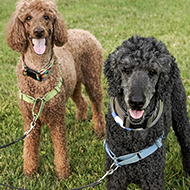
Schemes designed to combat inherited eye disease
Two new DNA testing schemes to combat progressive retinal atrophy (PRA) in the standard poodle have been approved by the Kennel Club.
The schemes, prcd-PRA and PRA (rcd4), follow consultation with the Poodle Breed Council. With no current treatment for the disease, standard poodle breeders will be able to use the tests to screen their animals and factor this into their breeding programmes.
“The Kennel Club constantly reviews DNA testing schemes in conjunction with breed clubs to ensure that breeders are supported with resources which help them to make responsible breeding decisions,” explained Gary Johnson, Kennel Club breeder services manager.
“DNA technology is making huge advances year upon year. It is very good news that standard poodle breeders are taking advantage of this technology which will be of huge benefit not only to current litters of the breed but future generations too.”
PRA is a well-recognised inherited condition to which several dog breeds are susceptible. The disease is defined by bilateral degeneration of the retina, causing progressive loss of vision resulting in total blindness.
Veterinary professionals wishing to find out which laboratories the Kennel Club can record results from, and which laboratories will send results direct to the Kennel Club, may refer to the worldwide DNA testing list.
Test results will be added to the dog’s registration details which will trigger the publication of the result in the next available Breed Records Supplement.
The result will appear on any new registration certificate issued for the dog and on the registration certificates of any future progeny of the dog, as well as on the Health Test Results Finder on the Kennel Club website.



 The latest
The latest